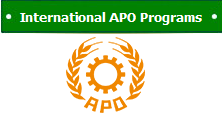National Productivity Organization
Anti Corruption Policy
1. Purpose
This policy applies to and is mandatory for NPO, all of its projects and all employees affiliated with NPO or any of its projects. This policy provides an overview of NPO’s anti-corruption definition, and explains the basic requirements that NPO employees shall follow to avoid corrupt practices throughout their business activities for NPO.
2. Introduction
For the purpose of NPO's anti-corruption policy, corruption in broader view will include any attempt to directly or indirectly:
a. Give or offer someone an improper advantage based on position, assignment or duty or demand.
b. Receive or accept an offer to receive an improper advantage based on position, assignment or duty.
2.1 Improper Advantage
Any benefit provided in return for the misuse of the receiver’s position, task or assignment will generally be considered an improper advantage. An improper advantage will usually be a benefit in the form of cash or objects with economic value, but may also include benefits without economic value. Personal benefits provided in relation to the recipient's position, task or assignment.
2.2 Bribery or "trading in influence"
Bribery or trading in influence is an offer (or acceptance) of an improper advantage to someone who has the ability to influence a decision.
A benefit is recognized as bribery where a company or a private person receives a benefit that may influence important decisions that it/he/she would not receive in free competition.
Bribery is corruption by definition.
2.3 Gifts
Exchanging gifts with customers, suppliers and business partners is a customary part of the business, and is permissible, as long as the gifts are kept within the confines of what is defined as "customary".
Under no circumstances NPO should offer or accept gifts of cash. Gifts other than cash will normally be customary if they are:
a) of negligible value,
b) branding material/marked with a company logo,
c) must not be kept hidden from superiors/management, e.g. gifts should be addressed to the recipient’s working address, i.e. company or public entity office address.
d) must not be provided or accepted in return for any benefit.
3. Guiding Principles
a) NPO shall act in an open, ethical and lawful manner towards all potential or existing customers, suppliers, and public officials.
b) NPO shall always perform its contractual obligations in accordance with the terms of the relevant contract, unless deviations are approved by the management and properly documented in company records.
c) Payments in cash or similar, or payments to unconfirmed recipients or account numbers shall not be accepted.
d) All activities, coverage of third parties' expenses, payments and contract performance on behalf of NPO shall be open and transparent.
e) All expenses shall be approved under the company procedures, documented and recorded in accordance with appropriate accounting standards.
f) Under no circumstances may any NPO employee receive cash or any kind of improper benefit from a supplier, business partner or public officials, including personal rebates, kickbacks, undocumented discounts, etc.
4. Administration of Policy
a) NPO management shall provide a corruption free environment for its employees to work for and engage itself with the corruption free organizations only.
b) Any sort of corruption complaints shall be addressed to the Chief Executive Officer (CEO).
c) Upon the receipt of corruption complaint to the competent authority i.e. CEO, a committee shall be formed to investigate the matter in detail and submit findings to the competent authority.
d) Individuals involved in corrupt activities may be subject to corporal punishments and legal actions as per prevalent country laws. Often, the individuals' superior will also be subject to proceedings if he/she knew or should have known that the corruptive act was conducted.
e) Exposed corruption results in negative publicity, which can do serious damage to the company’s reputation and business relationships. Therefore, NPO shall disengage itself from these sorts of organizations.




















